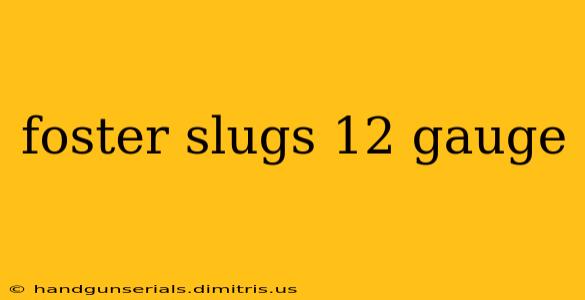Foster slugs, specifically those chambered in 12 gauge, occupy a unique niche in the world of shotgun ammunition. They're neither a standard buckshot load nor a rifled slug, offering a distinct balance of range, accuracy, and stopping power. This comprehensive guide will delve into the characteristics, applications, and considerations surrounding Foster slugs in 12 gauge shotguns.
Understanding Foster Slugs: Design and Function
Foster slugs are a type of lead projectile designed for smoothbore shotguns. Unlike rifled slugs, which rely on rifling within the barrel for spin stabilization, Foster slugs achieve stability through their design. The hallmark feature is their truncated cone shape with a driving band near the base. This band engages with the shotgun barrel, minimizing friction and improving accuracy compared to round ball slugs. The lead construction, while relatively soft, offers sufficient mass for penetration at typical hunting ranges.
Key Features of 12 Gauge Foster Slugs:
- Lead Construction: Generally made of lead, making them relatively inexpensive compared to other slug types. However, this also means they are more susceptible to deformation upon impact.
- Driving Band: This crucial feature improves accuracy by providing a consistent engagement point with the barrel.
- Truncated Cone Shape: This shape contributes to the slug's aerodynamic stability in flight.
- Smoothbore Compatibility: Specifically designed for smoothbore shotguns; they will not achieve optimal performance in rifled barrels.
Applications of Foster Slugs: Hunting and Self-Defense
While Foster slugs may not offer the same accuracy as rifled slugs at longer ranges, they provide a viable option for several applications:
Hunting:
- Close to Medium Range Hunting: Effective for hunting deer, hogs, and other medium-sized game at ranges up to 50-75 yards. Beyond this distance, accuracy becomes significantly less predictable.
- Brush Hunting: Their relatively low cost allows for more shots to be taken in dense brush, where precise aiming is difficult.
- Cost-Effectiveness: A budget-friendly option for hunters who prioritize affordability without sacrificing stopping power at reasonable ranges.
Self-Defense (with Important Caveats):
Using Foster slugs for self-defense is a complex issue. While their stopping power is substantial at close range, several factors must be considered:
- Penetration: Their significant penetration potential poses a risk of over-penetration, endangering bystanders.
- Accuracy: At close range, accuracy is acceptable; however, the risk of inaccurate shots increases significantly with distance.
- Legal Considerations: Laws regarding the use of slugs for self-defense vary widely by jurisdiction. Consult local laws and regulations before considering this application.
It is crucial to emphasize that choosing the right ammunition for self-defense requires careful consideration and expert advice. Foster slugs should only be considered for self-defense after careful evaluation of the risks and alternatives.
Comparing Foster Slugs to Other Slug Types
To understand the niche of Foster slugs, it's important to compare them to other 12-gauge slug types:
- Rifled Slugs: Offer superior accuracy and longer range than Foster slugs due to the rifling imparting spin stabilization. However, they require a rifled shotgun barrel.
- Sabot Slugs: These slugs utilize a plastic sabot that engages the rifling for enhanced accuracy. They're generally more expensive but offer excellent range and accuracy.
- Brenneke Slugs: Another popular type, they feature a hardened lead core and a plastic wad for improved accuracy and penetration.
Choosing and Using Foster Slugs Safely
When selecting Foster slugs, pay attention to the manufacturer's specifications, ensuring they are appropriate for your shotgun. Always practice safe gun handling procedures, including proper storage, cleaning, and use of eye and ear protection. Never exceed the recommended range for your chosen ammunition.
Conclusion
Foster slugs offer a practical and cost-effective solution for hunters needing reliable stopping power at moderate ranges. Their limitations, particularly concerning accuracy at longer distances and potential over-penetration, must be acknowledged. Thorough understanding of their characteristics is crucial before choosing Foster slugs for hunting or, even more importantly, for self-defense. Remember, responsible gun ownership and adherence to all relevant safety regulations are paramount.

